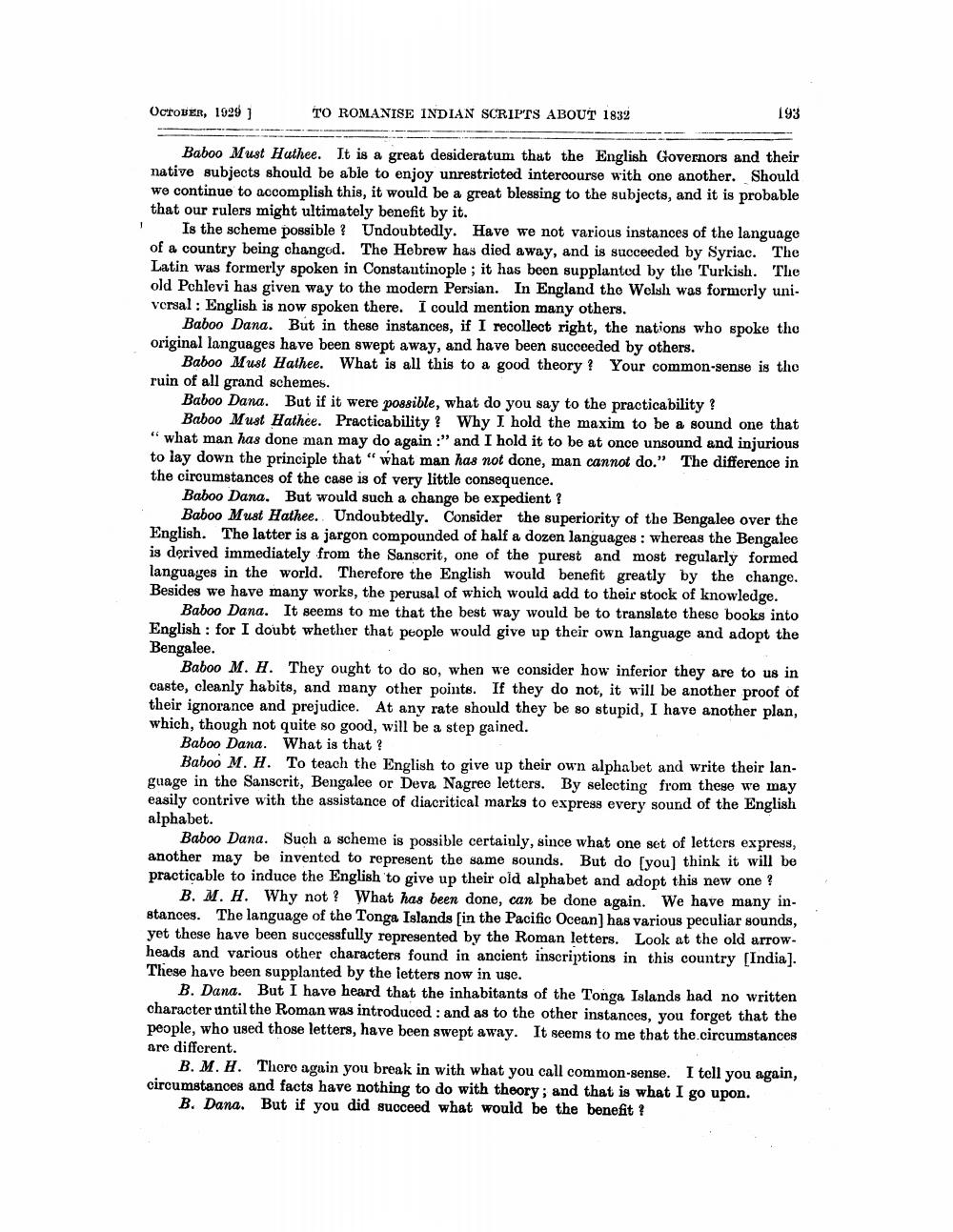________________
OCTOBER, 1929 ]
TO ROMANISE INDIAN SCRIPTS ABOUT 1832
193
Baboo Must Hathee. It is a great desideratum that the English Governors and their native subjects should be able to enjoy unrestricted intercourse with one another. Should we continue to accomplish this, it would be a great blessing to the subjects, and it is probable
that our rulers might ultimately benefit by it. ! Is the scheme possible ? Undoubtedly. Have we not various instances of the language of a country being changed. The Hebrew has died away, and is succeeded by Syriac. The Latin was formerly spoken in Constantinople; it has been supplanted by the Turkish. The old Pchlevi has given way to the modern Persian. In England the Welsh was formerly uni. versal : English is now spoken there. I could mention many others.
Baboo Dana. But in these instances, if I recollect right, the nations who spoke the original languages have been swept away, and have been succeeded by others.
Baboo Must Hathee. What is all this to a good theory? Your common sense is the ruin of all grand schemes.
Baboo Dana. But if it were possible, what do you say to the practicability ?
Baboo Must Hathee. Practicability? Why I hold the maxim to be a sound one that "what man has done man may do again :" and I hold it to be at once unsound and injurious to lay down the principle that " what man has not done, man cannot do." The difference in the circumstances of the case is of very little consequence.
Baboo Dana. But would such a change be expedient ?
Baboo Must Hathee. Undoubtedly. Consider the superiority of the Bengalee over the English. The latter is a jargon compounded of half a dozen languages: whereas the Bengalee is derived immediately from the Sanscrit, one of the purest and most regularly formed languages in the world. Therefore the English would benefit greatly by the change. Besides we have many works, the perusal of which would add to their stock of knowledge.
Baboo Dana. It seems to me that the best way would be to translate these books into English: for I doubt whether that people would give up their own language and adopt the Bengalee.
Baboo M. H. They ought to do so, when we consider how inferior they are to us in caste, cleanly habits, and many other points. If they do not, it will be another proof of their ignorance and prejudice. At any rate should they be so stupid, I have another plan, which, though not quite so good, will be a step gained.
Baboo Dana. What is that?
Baboo M. H. To teach the English to give up their own alphabet and write their language in the Sanscrit, Bengalee or Deva Nagree letters. By selecting from these we may easily contrive with the assistance of diacritical marks to express every sound of the English alphabet.
Baboo Dana. Such a scheme is possible certainly, since what one set of letters express, another may be invented to represent the same sounds. But do (you) think it will be practicable to induce the English to give up their old alphabet and adopt this new one!
B. M. H. Why not? What has been done, can be done again. We have many instances. The language of the Tonga Islands (in the Pacific Ocean) has various peculiar sounds, yet these have been successfully represented by the Roman letters. Look at the old arrowheads and various other characters found in ancient inscriptions in this country [India]. These have been supplanted by the letters now in use.
B. Dana. But I have heard that the inhabitants of the Tonga Islands had no written character until the Roman was introduced : and as to the other instances, you forget that the people, who used those letters, have been swept away. It seems to me that the circumstances are different.
B.M.H. There again you break in with what you call common sense. I tell you again, circumstances and facts have nothing to do with theory, and that is what I go upon.
B. Dana. But if you did succeed what would be the benefit ?




